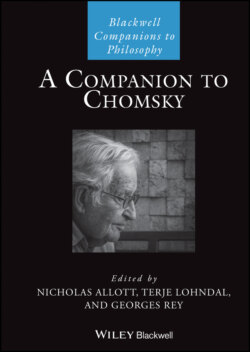Читать книгу A Companion to Chomsky - Группа авторов - Страница 81
7.11 Conclusion
ОглавлениеIn many ways, I think of my lines of work as (partly inadvertent, partly adventitious) elaborations of several of the approaches to language and mind that Chomsky and [Jerry] Fodor brought into the study of language, thus creating a more general revolution in how cognitive science thinks about the nature of mind. The most general conclusion pertains to how much and how widely knowledge is a function of the structure of mind, and how restricted the influence of experience is. This is why the many studies of acquisition in infants with deprivation of input showed so little effect on the final product.
At the same time, there is much to be said in support of Zellig Harris's perspective, which looks so different on the surface. After all, Harris held, and so did Plato, that the knowledge we had at birth is forgotten. I interpret this to mean that although we are surely endowed with a language capacity, we forget, or never knew, how it is instantiated in English in particular. For the latter, we have to observe and integrate the evidence that is provided in the surface forms of the exposure language.
If I had to summarize the odyssey that this succession of studies chronicles, the two‐line conclusion might be: Language acquisition is obviously impossible, but somehow they do it. Empiricism is innate, but somehow we get over it.
At peril of going on forever here, I do want to say a few more words about how this enterprise unfolded, for it was certainly a product of “groupthink.” Henry Gleitman (ultimately the teacher of all of us collaborators) started a research seminar in which we all continued to talk for almost half a century. After a while, it came to be called “the cheese seminar,” because of the refreshments provided halfway through these long evenings of talk, and then, with the addition of insights and methods from Trueswell's students joining this larger group, “the cheese and trackers seminar” – not only cheese and not only eye‐tracking. It was decades of cross talk and collaboration, continuing to this very day, for a great circle of young scientists, some of whom I've mentioned in sketching the styles of investigation and explanation that emerged from this group. And I'm glad to say that I'm more than proud, that this seminar continues: I am particularly proud to say that in the present incarnation of this kind of research seminar, now led by Trueswell, my very first postdoc and early collaborator, Sharon Armstrong (professor of psychology at LaSalle University), continues to attend and to contribute to the next generation of this half‐century‐long conversation.
Language learning isn't really instantaneous; it happens in real time.
